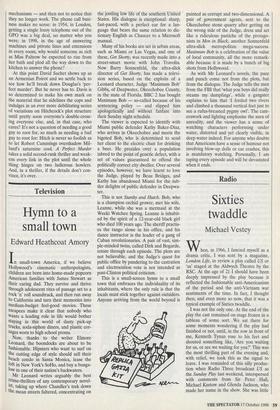Television
Hymn to a small town
Edward Heathcoat Amory
In small-town America, if we believe Hollywood's cinematic anthropologists, children are born into home-made popcorn American families with James Stewart as their caring dad. They survive and thrive through adolescent rites of passage set to a rock 'n' roll soundtrack, and then run away to California and turn their memories into medium-budget feel-good movies. These escapees make it clear that nobody who wants a leading role in life would bother staying in this world of dusty pick-up trucks, soda-siphon diners, and plastic cor- sages worn to high school proms.
Now, thanks to the writer Elmore Leonard, the boondocks are about to be fashionable. Hipsters who want to surf on the cutting edge of style should sell their beach condo in Santa Monica, lease the loft in New York's SoHo, and buy a bunga- low in one of their nation's backwaters.
Mr Leonard writes arguably the best crime-thrillers of any contemporary novel- ist, taking up where Chandler's trek down the mean streets faltered, concentrating on the jostling low life of the southern United States. His dialogue is exceptional: sharp, fast-paced, with a perfect ear for a lan- guage that bears the same relation to dic- tionary English as Chaucer to a Microsoft manual.
Many of his books are set in urban areas, such as Miami or Las Vegas, and one of these, Get Shorty, was recently made into a street-smart movie with John Travolta. Now Barry Sonnenfeld, the ultra-slick director of Get Shorty, has made a televi- sion series, based on the exploits of a Leonard character, Judge 'Maximum Bob' Gibbs, of Deeliwater, Okeechobee County, in the state of Florida. BBC 2 has bought Maximum Bob — so-called because of his sentencing policy — and slipped him apologetically and without fanfare into their Sunday night schedule.
The viewer is expected to identify with Miami public defender Kathy Baker-Diaz, who arrives in Okeechobee and meets the bigoted Bob, who is determined to send her client to the electric chair for drinking a beer. He presides over a population inbred to the point of genetic defect, with a set of values guaranteed to offend the politically correct city dweller. Over several episodes, however, we have learnt to love the Judge, played by Beau Bridges, and Kathy has abandoned Miami for the sub- tler delights of public defender in Deepwa- ter.
This is not Starsky and Hutch. Bob, who is a champion orchid grower, met his wife, Leanne, while she was a mermaid at the Weeki Watchee Spring. Leanne is inhabit- ed by the spirit of a 12-year-old black girl who died 100 years ago. The sheriff practis- es the tango alone in his office, and his dance instructor is the leader of a gang of Cuban revolutionaries. A pair of vast, sim- ple-minded twins, called Dirk and Bogarde, rotate through each episode. The plots are not believable, and the Judge's quest for public office by pandering to the castration and electrocution vote is not intended as post-Clinton political criticism.
This is a small-screen hymn to a small town that embraces the individuality of its inhabitants, where the only rule is that the locals must stick together against outsiders. Anyone arriving from the world beyond is painted as corrupt and two-dimensional. A pair of government agents, sent to the Okeechobee stone quarry after getting on the wrong side of the Judge, dress and act like a ridiculous pastiche of the protago- nists in Men in Black, another Sonnenfeld ultra-slick metropolitan mega-success. Maximum Bob is a celebration of the value of local community, all the more remark- able because it is made by a bunch of big shots from Hollywood.
As with Mr Leonard's novels, the pace and punch come not from the plots, but from the dialogue. The Judge tells the men from the FBI that 'what you boys did really steams my dumplings', while a gangster explains to him that 'I forded two rivers and climbed a thousand vertical feet just to see a rufus-breasted pygmy owl'. The cam- erawork and lighting emphasise the aura of unreality, and the viewer has a sense of watching characters performing under water, distorted and yet clearly visible, in deep water indeed. For anyone who doubts that Americans have a sense of humour not involving blow-up dolls or car crashes, this is mandatory watching. Personally, I am taping every episode and will be devastated when it ends.










































































 Previous page
Previous page